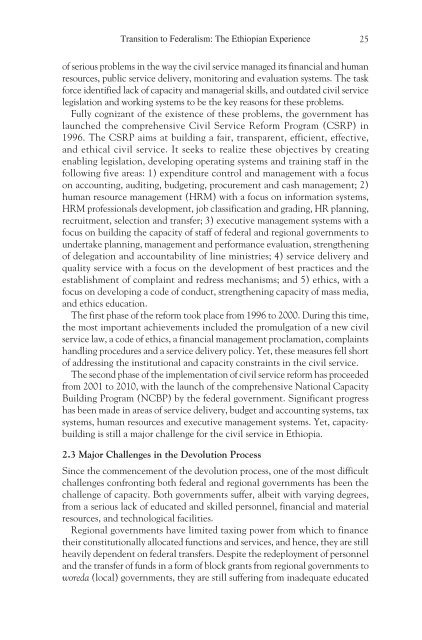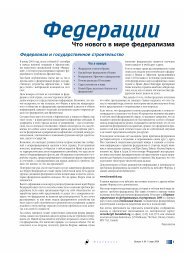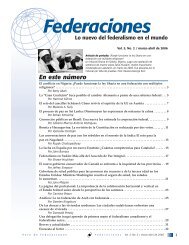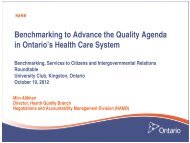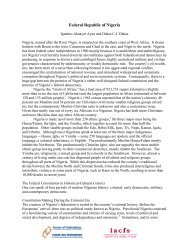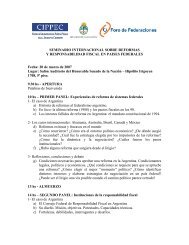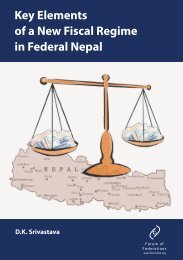Transition to Federalism: The Ethiopian Experience - Forum of ...
Transition to Federalism: The Ethiopian Experience - Forum of ...
Transition to Federalism: The Ethiopian Experience - Forum of ...
Create successful ePaper yourself
Turn your PDF publications into a flip-book with our unique Google optimized e-Paper software.
<strong>Transition</strong> <strong>to</strong> <strong>Federalism</strong>: <strong>The</strong> <strong>Ethiopian</strong> <strong>Experience</strong><br />
<strong>of</strong> serious problems in the way the civil service managed its financial and human<br />
resources, public service delivery, moni<strong>to</strong>ring and evaluation systems. <strong>The</strong> task<br />
force identified lack <strong>of</strong> capacity and managerial skills, and outdated civil service<br />
legislation and working systems <strong>to</strong> be the key reasons for these problems.<br />
Fully cognizant <strong>of</strong> the existence <strong>of</strong> these problems, the government has<br />
launched the comprehensive civil service reform program (csrp) in<br />
1996. <strong>The</strong> csrp aims at building a fair, transparent, efficient, effective,<br />
and ethical civil service. it seeks <strong>to</strong> realize these objectives by creating<br />
enabling legislation, developing operating systems and training staff in the<br />
following five areas: 1) expenditure control and management with a focus<br />
on accounting, auditing, budgeting, procurement and cash management; 2)<br />
human resource management (hrm) with a focus on information systems,<br />
hrm pr<strong>of</strong>essionals development, job classification and grading, hr planning,<br />
recruitment, selection and transfer; 3) executive management systems with a<br />
focus on building the capacity <strong>of</strong> staff <strong>of</strong> federal and regional governments <strong>to</strong><br />
undertake planning, management and performance evaluation, strengthening<br />
<strong>of</strong> delegation and accountability <strong>of</strong> line ministries; 4) service delivery and<br />
quality service with a focus on the development <strong>of</strong> best practices and the<br />
establishment <strong>of</strong> complaint and redress mechanisms; and 5) ethics, with a<br />
focus on developing a code <strong>of</strong> conduct, strengthening capacity <strong>of</strong> mass media,<br />
and ethics education.<br />
<strong>The</strong> first phase <strong>of</strong> the reform <strong>to</strong>ok place from 1996 <strong>to</strong> 2000. during this time,<br />
the most important achievements included the promulgation <strong>of</strong> a new civil<br />
service law, a code <strong>of</strong> ethics, a financial management proclamation, complaints<br />
handling procedures and a service delivery policy. Yet, these measures fell short<br />
<strong>of</strong> addressing the institutional and capacity constraints in the civil service.<br />
<strong>The</strong> second phase <strong>of</strong> the implementation <strong>of</strong> civil service reform has proceeded<br />
from 2001 <strong>to</strong> 2010, with the launch <strong>of</strong> the comprehensive national capacity<br />
Building program (ncBp) by the federal government. significant progress<br />
has been made in areas <strong>of</strong> service delivery, budget and accounting systems, tax<br />
systems, human resources and executive management systems. Yet, capacitybuilding<br />
is still a major challenge for the civil service in ethiopia.<br />
2.3 Major Challenges in the Devolution Process<br />
since the commencement <strong>of</strong> the devolution process, one <strong>of</strong> the most difficult<br />
challenges confronting both federal and regional governments has been the<br />
challenge <strong>of</strong> capacity. Both governments suffer, albeit with varying degrees,<br />
from a serious lack <strong>of</strong> educated and skilled personnel, financial and material<br />
resources, and technological facilities.<br />
regional governments have limited taxing power from which <strong>to</strong> finance<br />
their constitutionally allocated functions and services, and hence, they are still<br />
heavily dependent on federal transfers. despite the redeployment <strong>of</strong> personnel<br />
and the transfer <strong>of</strong> funds in a form <strong>of</strong> block grants from regional governments <strong>to</strong><br />
woreda (local) governments, they are still suffering from inadequate educated<br />
25


